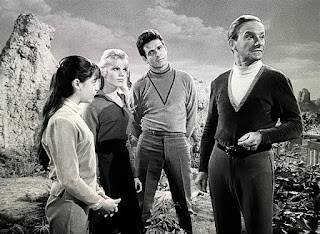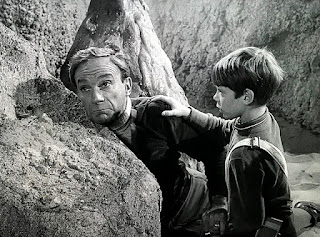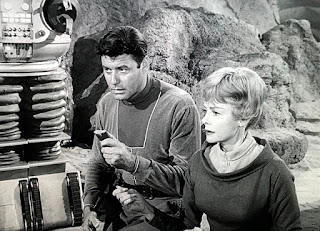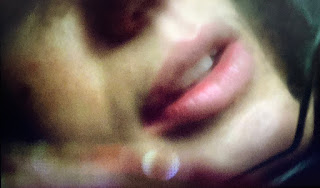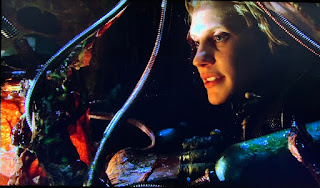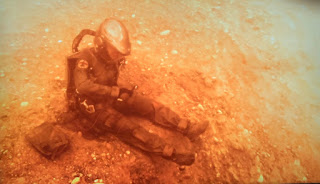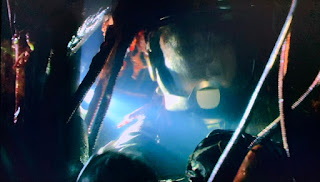"That's it exactly! I'm a scoundrel. A thoroughly bad sort. Hopelessly unreliable. I'm doing you the greatest favor by furnishing you a substitute for my morbid, villainous brain."
-Dr. Smith working the Invaders from the Fifth Dimension-
"Love. What is it?"
-Invaders from the Fifith Dimension-
The eight entry in the franchise was of course not only foreshadowed at the end of My Friend, Mr. Nobody, but was actually previewed first at the end of the series pilot No Place To Hide.
Writer Shimon Wincelberg under the pseudonym of S. Bar-David returns for his last scriptwriting contribution with Lost In Space, Season One, Episode 8, Invaders From The Fifth Dimension.
Though the invaders originally appeared at the end of the pilot No Place To Hide, when that same stock footage was utilized for The Hungry Sea (S1, E5) those invaders were not revealed and dropped so that The Hungry Sea would instead segue way into Welcome Stranger (S1, E6). Well, the invaders, and Wincelberg's original concept reappear here for Invaders From The Fifth Dimension.
Ultimately, it was another episode that turned to footage from the original pilot, No Place To Hide, for its story use following two original stories, Welcome Stranger (S1, E6) and My Friend, Mr. Nobody (S1, E7).
Wincelberg after utilizing his pseudonym S. Bar-David was feeling less chafed about the script changes for Invaders From The Fifth Dimension and in the end allowed his real name to appear in the credits. Wincelberg had a solid history as a writer alternating between his real name and S. Bar-David for the credit he would be given. His contentious relationship over his scripts with Irwin Allen would conclude on Lost In Space with this episode. Though he would pen one story each for Allen's Voyage To The Bottom Of The Sea, Season Two opener Jonah And The Whale (1965), and The Time Tunnel (1966-1967), Season One opener Rendezvous With Yesterday.
Wincelberg also butt heads with Gene Roddenberry over at Star Trek (1966-1969) but still penned Dagger Of The Mind (S1, E9) and a personal favorite, The Galileo Seven (S1, E16), both under his pseudonym S. Bar-David following rewrites of his work yet again.
In science fiction Wincelberg wrote for The Immortal (1970-1971) and Harlan Ellison's The Starlost (1973-1974). As S. Bar-David he wrote the series finale for the Planet Of The Apes (1974), Up Above The World So High. He used his real name for Man From Atlantis (1977-1978) episode Imp. Nonethless his schizophrenic crediting approach on various series still earned him a notable reputation in science fiction.

Wincelberg would later work on medical TV series Trapper John M.D. and others up to and including Law And Order before retiring in 1997.
Invaders From The Fifth Dimension saw the creative team and writers at Lost In Space facing the writing on the wall from CBS concerning Dr. Zachary Smith as a villain of child endangerment lording over Will and Penny on the series. Many requests were made regarding the character's actions as well as Will Robinson's reactions. Ultimately things were going to change for Smith and those changes were slowly slipping into the show by actor Jonathan Harris himself along with the pressures asserted in that direction by CBS itself.
I'm not sure why the Dr. Smith character, played by Parker Posey, on the new Netflix series reboot didn't work for me, but her stamp on the character and her contemporary form of twisted menace just doesn't quite work.
Harris was exceptional at balancing the part of opportunist and villain and manipulator where required. The cast of the original Lost In Space was also excellent at holding his feet to the fire while begrudgingly accepting his presence and often coming up short of banishing his ass from their castaway family along the way.
A recent viewing of USA series Colony (2016-present) reminds me once again of how good Harris was in the part. Actor Peter Jacobson plays a very good, similar, more contemporary creation called Alan Snyder on that series. Of course the variables are different including the fact the character is earthbound and surrounded by a vast pool of recurring characters and more contemporary, dynamic dramatic conflict. It underscores and illustrates just how impressive Harris' Smith was being locked into a small, family-bound cast. What he and that cast achieved week after week with the scripts they were provided during an early era of television is nothing short of amazing.

In Colony Alan Snyder smugly informs a colleague in the episode Disposable Heroes (S3, E11), "I play all sides, that's my gift." And as good as Jacobson is in that role, best I've seen in some time in that capacity, Harris was indeed one of the best villains ever created and he was largely responsible for making that happen, a real natural like Jacobson is himself in Colony.
While the transformation was happening for Smith, the writers and creators were finding ways to soften Robot with the younger eyes at home. Efforts were made to make him less unpredictable and more likeable. In many ways the same happened to Godzilla as that franchise prospered into the 1960s. Godzilla would become a hero figure for children, in part thanks to Gamera, rather than the unpredictable force of nature as the creature was first established.
This latest, fine entry in the series was directed by one-time Lost In Space director Leonard Horn. Horn worked for Irwin Allen on six (6) episodes of Voyage To The Bottom Of The Sea Season One and three (3) for Season Two. Horn also worked on The Outer Limits for three (3) episodes (The Man Who Was Never Born, The Zanti Misfits, The Children Of Spider County) and even directed the pilot for Wonder Woman (1975) but sadly died young at just 48 years of age the same year of Linda Carter's Wonder Woman's launch and even before it aired.

The invaders of the entry are also frighteningly macabre in much the same way the aliens disturbed us in Star Trek pilot The Cage. At this point, we are far from straight up monster of the week-styled storytelling. Invaders From The Fifth Dimension is also thoughtful in its approach to a downed alien craft dealing with many of the same problems as our Robinson family. The uniqueness of the otherworldly creatures is further amplified by the ominous, simple but uniquely designed, Tardis-like alien spacecraft.
The entry focuses on communication and the value of life as projected by the Invaders. It would be the last contribution by writer Shimon Wincelberg and a memorable one. And once again, Lost In Space on Blu-Ray completely remastered has never looked more amazing.
Writer: Shimon Wincelberg. Director: Leonard Horn.







